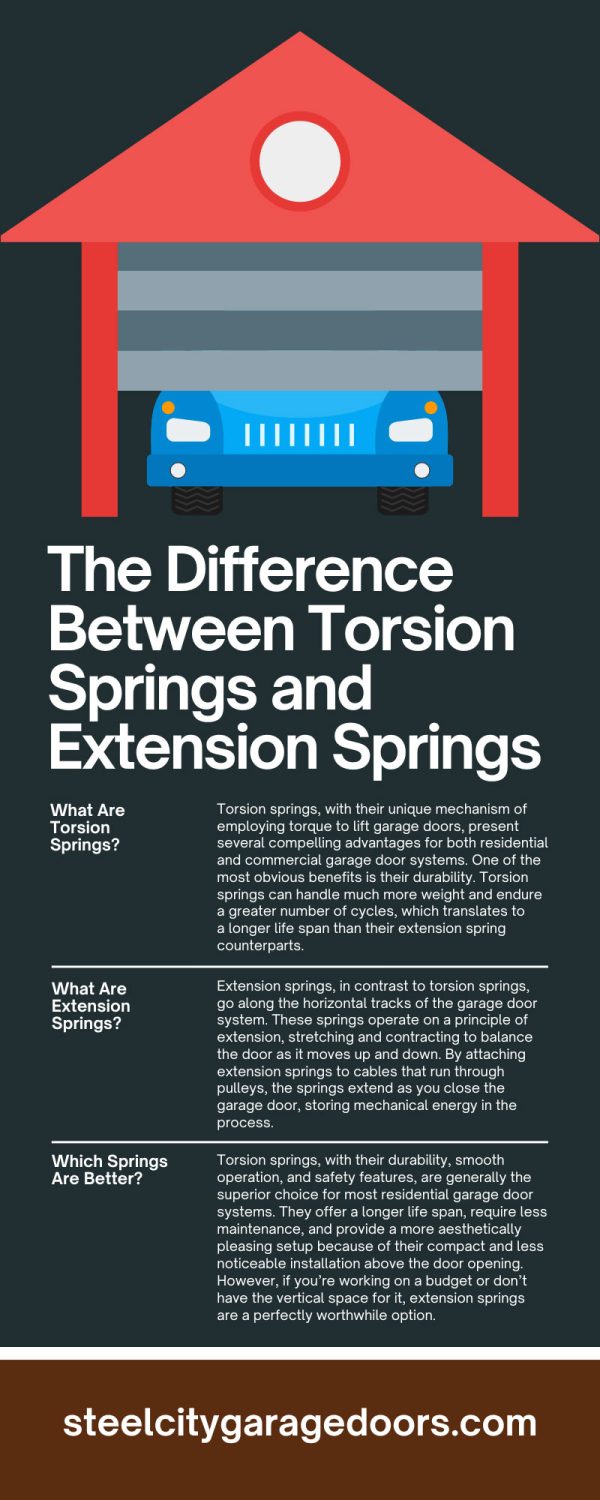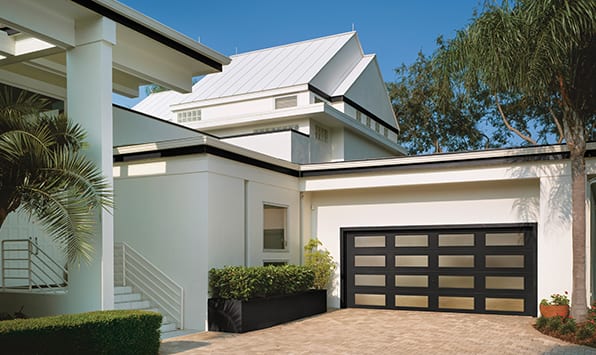When it comes to your garage door, it’s always a good idea to understand what type of parts or machinery that you’re working with. For example, what type of springs does it rely on for opening and closing? Two of the most common options are torsion and extension springs.
But what do those terms mean? How do they affect your garage? Today, Steel City Garage Doors is here to explain the difference between torsion springs and extension springs and go over a few of the pros and cons of each option. Knowing what you’re working with can make it much easier to keep up with regular maintenance.
What Are Torsion Springs?
Torsion springs, as the name implies, use torque to balance and lift heavier garage doors. They use this rotational force from above the garage door opening. By tightly winding and unwinding on a shaft, they manage the door’s weight as it opens and closes. The torque generated by the torsion spring counterbalances the door’s weight, making it easier to operate manually or with an electric opener.
Benefits of Torsion Springs
Torsion springs, with their unique mechanism of employing torque to lift garage doors, present several compelling advantages for both residential and commercial garage door systems. One of the most obvious benefits is their durability. Torsion springs can handle much more weight and endure a greater number of cycles, which translates to a longer life span than their extension spring counterparts. This durability makes them a cost-effective investment in the long run, as they require fewer replacements over the lifetime of a garage door.
Furthermore, torsion springs contribute to a smoother, more controlled operation of garage doors. Their ability to evenly distribute the weight of the door results in less wear and tear on the garage door opener and other mechanical parts, promoting longer equipment life and reduced maintenance costs. The enhanced balance provided by torsion springs also reduces the likelihood of the door hanging unevenly or becoming stuck, which can be a common issue with extension springs.
An often overlooked benefit of torsion springs is that they’re significantly safer. Given their placement and the way they function, torsion springs are less prone to the sudden, uncontrolled release of energy if they break, compared to extension springs.
Disadvantages of Torsion Springs
While torsion springs offer numerous benefits, they come with their own set of disadvantages that homeowners and technicians should consider. One of the primary drawbacks is the initial cost. Torsion springs are generally more expensive than extension springs, both in terms of the spring itself and the cost of installation.
Another disadvantage is the complexity of installation and adjustment. Torsion springs typically require installation by a professional who has the necessary tools and knowledge to tension the springs correctly. This complexity not only adds to the cost but also means that DIY repairs or adjustments are not advisable for the average homeowner, increasing the dependence on professional services for maintenance.
What Are Extension Springs?
Extension springs, in contrast to torsion springs, go along the horizontal tracks of the garage door system. These springs operate on a principle of extension, stretching and contracting to balance the door as it moves up and down. By attaching extension springs to cables that run through pulleys, the springs extend as you close the garage door, storing mechanical energy in the process. Naturally, as you open the door, they release the stored energy and close, which helps lift up the door and requires far less effort than opening it manually.
Benefits of Extension Springs
Given their design, extension springs are more common in residential homes over industrial garages but offer some distinct benefits that make them a reliable option. Their primary advantage lies in their cost-effectiveness. Extension springs are generally less expensive than torsion springs regarding both the specific part and general installation costs. This budget-friendly approach makes them an attractive option for those with lighter garage doors where the high durability of torsion springs is not a necessity.
Another benefit of extension springs is their compatibility with smaller or older garages. Because we install them along the horizontal door tracks, they don’t need as much headroom as torsion springs. This feature is particularly beneficial for older homes where modifying the garage structure for torsion springs installation isn’t feasible.
Extension springs have a solid reputation for being simplistic and easy to operate. Unlike torsion springs, they do not require special tools or knowledge for setup, making them a more accessible option. This can further reduce costs by eliminating the need for professional installation, provided safety precautions are properly followed.
Disadvantages of Extension Springs
While extension springs provide a cost-effective and practical solution for many garage door systems, they also come with several drawbacks. One significant disadvantage is their safety concerns. Even with the use of safety cables, if an extension spring breaks, it can still pose a risk of injury or damage due to the potential energy released. Because the spring stretches out when you close your garage door, a sudden break or snap can cause it to release that energy instantaneously, increasing the likelihood of damage or injury.
Another issue is the uneven wear they can cause to the garage door system. Since extension springs don’t distribute the door’s weight as evenly as torsion springs, they may result in an unbalanced door or increased wear on one side over the other. This imbalance often results in a more frequent need for adjustments and can shorten the life span of other door components.
Which Springs Are Better?
Now that you understand the difference between torsion springs and extension springs, you may wonder which one is better for your home or business. Determining which type of spring is better for a garage door system depends largely on the specific requirements of the door and the priorities of the homeowner.
Torsion springs, with their durability, smooth operation, and safety features, are generally the superior choice for most residential garage door systems. They offer a longer life span, require less maintenance, and provide a more aesthetically pleasing setup because of their compact and less noticeable installation above the door opening. However, if you’re working on a budget or don’t have the vertical space for it, extension springs are a perfectly worthwhile option.
Ready to ensure your garage door operates smoothly and safely? Steel City Garage Doors specializes in both torsion and extension garage spring repairs, offering professional and affordable services tailored to your needs. Don’t wait for a small issue to become a big problem. Contact us today for a hassle-free consultation and discover how we can enhance the functionality and safety of your garage door system.




